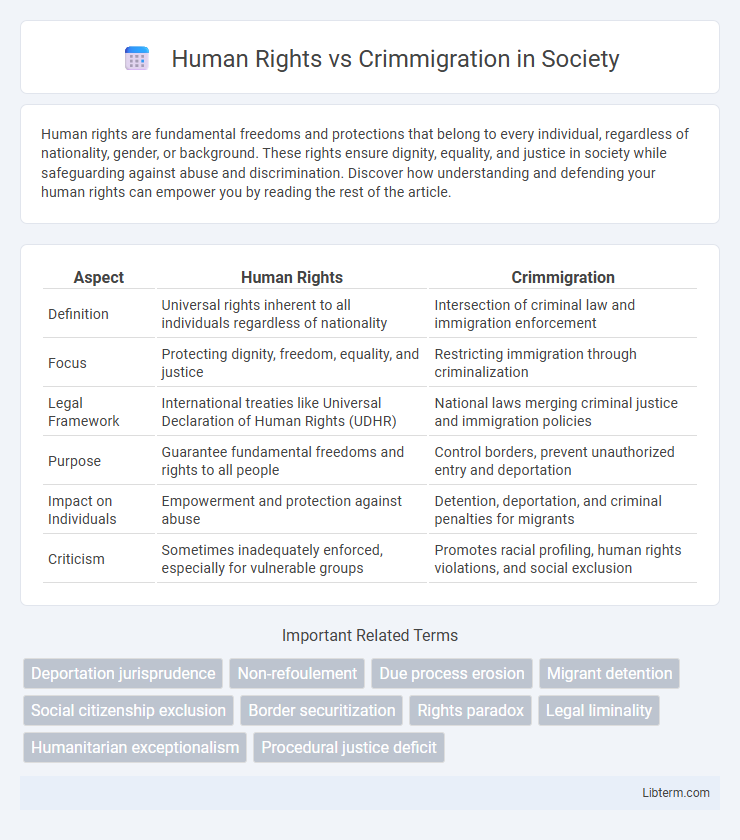Human rights are fundamental freedoms and protections that belong to every individual, regardless of nationality, gender, or background. These rights ensure dignity, equality, and justice in society while safeguarding against abuse and discrimination. Discover how understanding and defending your human rights can empower you by reading the rest of the article.
Table of Comparison
| Aspect | Human Rights | Crimmigration |
|---|---|---|
| Definition | Universal rights inherent to all individuals regardless of nationality | Intersection of criminal law and immigration enforcement |
| Focus | Protecting dignity, freedom, equality, and justice | Restricting immigration through criminalization |
| Legal Framework | International treaties like Universal Declaration of Human Rights (UDHR) | National laws merging criminal justice and immigration policies |
| Purpose | Guarantee fundamental freedoms and rights to all people | Control borders, prevent unauthorized entry and deportation |
| Impact on Individuals | Empowerment and protection against abuse | Detention, deportation, and criminal penalties for migrants |
| Criticism | Sometimes inadequately enforced, especially for vulnerable groups | Promotes racial profiling, human rights violations, and social exclusion |
Introduction to Human Rights and Crimmigration
Human rights encompass fundamental protections such as the right to due process, freedom from arbitrary detention, and equal treatment under the law, which serve as a global standard for justice and dignity. Crimmigration merges criminal law and immigration enforcement, often leading to increased detention and deportation measures that can conflict with established human rights principles. The tension between safeguarding individual rights and enforcing immigration control highlights critical challenges in maintaining legal fairness and humanitarian standards.
Defining Crimmigration: Where Crime Meets Immigration Law
Crimmigration represents the intersection of criminal law and immigration enforcement, where immigration violations are increasingly treated as criminal offenses. This blending results in harsher penalties such as detention and deportation for non-citizens accused of crimes, often undermining fundamental human rights protections like due process and fair trial standards. The expanding scope of crimmigration challenges the balance between national security interests and the preservation of immigrant rights under international human rights frameworks.
Historical Evolution of Crimmigration Policies
Crimmigration policies have evolved significantly since the late 20th century, intertwining criminal law and immigration enforcement in ways that increasingly challenge established human rights frameworks. Historically, the shift intensified during the 1980s and 1990s, marked by legislative measures like the Illegal Immigration Reform and Immigrant Responsibility Act (IIRIRA) of 1996 in the United States, which expanded the grounds for deportation linked to criminal conduct. This convergence of immigration control and criminal justice has raised critical concerns regarding due process, arbitrary detention, and the erosion of protections for non-citizens under international human rights law.
Human Rights Principles in Immigration Enforcement
Human rights principles in immigration enforcement emphasize the protection of due process, non-discrimination, and the right to family unity, ensuring that all migrants receive fair treatment under the law. Enforcement practices must align with international human rights standards such as the Universal Declaration of Human Rights and the International Covenant on Civil and Political Rights, safeguarding individuals from arbitrary detention, excessive use of force, and unlawful deportation. Prioritizing human rights fosters a humane and just immigration system that respects the dignity and fundamental freedoms of all migrants.
The Impact of Crimmigration on Migrants’ Rights
Crimmigration policies increasingly blur the lines between criminal law and immigration enforcement, significantly impacting migrants' human rights by subjecting them to detention and deportation without due process. This convergence often leads to violations of rights such as access to legal representation, protection from arbitrary detention, and family unity, exacerbating vulnerability among migrant populations. Empirical studies reveal that heightened crimmigration enforcement disproportionately affects undocumented migrants, undermining fundamental protections guaranteed under international human rights law.
Legal Frameworks: International Human Rights vs. National Security
International human rights frameworks, including the Universal Declaration of Human Rights and the International Covenant on Civil and Political Rights, establish protections for individuals against unlawful detention, discrimination, and deportation. National security laws and crimmigration policies, often implemented through immigration enforcement statutes, prioritize state sovereignty and public safety by enabling detention, removal, and criminalization of migrants. Legal tensions arise as courts balance treaty obligations with sovereign powers, influencing case law on due process, non-refoulement, and the right to family unity in crimmigration contexts.
Due Process Concerns in Crimmigration Proceedings
Due process concerns in crimmigration proceedings highlight the tension between immigration enforcement and fundamental human rights protections, as individuals often face expedited removals without adequate legal representation or the opportunity to present a full defense. The lack of procedural safeguards, such as limited access to counsel and insufficient notice of charges, undermines fair hearing standards and increases the risk of wrongful deportations. Protecting due process in this context is critical to upholding the principles of justice, equality, and non-discrimination embedded in international human rights law.
Discrimination and Racial Profiling in Crimmigration
Crimmigration disproportionately targets marginalized communities, perpetuating systemic discrimination through racial profiling practices that violate fundamental human rights. Law enforcement agencies often rely on biased criteria, leading to unjust detentions and deportations based on race or ethnicity rather than actual criminal behavior. These practices undermine equal protection under the law and exacerbate social inequalities inherent in immigration enforcement policies.
Balancing Public Safety and Human Rights Protections
Balancing public safety and human rights protections within crimmigration requires enforcing immigration laws without compromising fundamental rights like due process and freedom from arbitrary detention. Policies must prioritize proportionality by ensuring that security measures do not infringe on protections against discrimination or unlawful treatment. Effective oversight and transparent accountability mechanisms help reconcile the dual objectives of maintaining social order and upholding human dignity.
Future Perspectives: Reforming Crimmigration for Human Rights Compliance
Future perspectives on reforming crimmigration prioritize aligning immigration enforcement with international human rights standards to prevent abuses and uphold dignity. Policy reforms include implementing safeguards against racial profiling, ensuring due process, and promoting alternatives to detention that respect individual rights. Technological advancements and data-driven approaches offer opportunities for transparent, accountable enforcement that balances security with human rights compliance.
Human Rights Infographic

 libterm.com
libterm.com